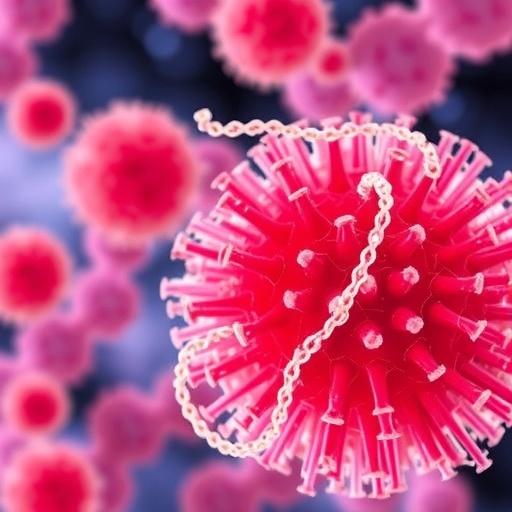In a groundbreaking advancement within the realm of cancer immunotherapy, researchers have developed an innovative bacterial-based treatment known as ACTM-838, targeting the hostile immune environment prevalent in solid tumors. Published recently in the esteemed journal Oncotarget, this study illuminates how ACTM-838 employs a genetically engineered strain of Salmonella Typhimurium to deliver potent immune-activating payloads directly to the tumor microenvironment (TME), enhancing the body’s natural ability to combat cancerous growths. This treatment heralds a new frontier aimed at overcoming the intrinsic immunosuppressive barriers that have long challenged effective management of solid malignancies.
Central to the ACTM-838 approach is its capacity to systemically administer a live attenuated bacterial vector optimized for tumor localization. Upon intravenous delivery, this modified Salmonella Typhimurium strain preferentially accumulates within solid tumors, exploiting its innate ability to target phagocytic cells residing in the TME. This selective tropism facilitates concentrated delivery of therapeutic proteins while minimizing exposure to healthy tissues, thereby substantially mitigating systemic toxicity—a significant concern in earlier bacterial therapies.
The payload delivered by ACTM-838 comprises a sophisticated fusion of immune agonists: the interleukin-15/interleukin-15 receptor alpha complex (IL-15/IL-15Rα) alongside a modified Stimulator of Interferon Genes (STING) agonist. IL-15/IL-15Rα plays a pivotal role in stimulating the proliferation and activation of cytotoxic lymphocytes, fostering robust adaptive immune responses. Meanwhile, the STING pathway acts as a critical sensor within innate immunity, activating type I interferon responses essential for initiating potent anti-tumor immunity. The architectural design of ACTM-838 ensures co-delivery of these complementary factors to reprogram the immunosuppressive TME towards an immunogenic milieu conducive to sustained tumor eradication.
Preclinical investigations detailed in the study demonstrate ACTM-838’s remarkable ability to trigger tumor regression across multiple murine models, including notoriously treatment-resistant variants. This bacterially-mediated therapy not only facilitated significant tumor shrinkage but also conferred durable protection, as evidenced by rechallenge experiments where cured mice resisted tumor recurrence. Such findings suggest the establishment of durable immune memory, a holy grail of cancer immunotherapy aimed at preventing relapse.
Moreover, ACTM-838’s synergy with immune checkpoint blockade therapies such as anti-PD1 monoclonal antibodies underscores its potential clinical utility. Combination treatment regimens exhibited enhanced efficacy beyond monotherapies, reshaping tumor immune landscapes to favor effector T-cell infiltration and reducing immunosuppressive regulatory T-cells and exhausted phenotypes. This dual modality exemplifies the promise of integrating bacterial vectors with existing immunotherapeutic agents to surmount current treatment ceiling effects.
On a mechanistic level, single-cell RNA sequencing analyses revealed novel myeloid subsets that emerge within the TME following ACTM-838 administration. These subsets include proliferative macrophages and metabolically reprogrammed neutrophil populations characterized by distinct transcriptional signatures. Such cellular dynamics underscore the complex innate immune orchestration initiated by this therapy, which collectively drives adaptive response amplification and tumor immune sensitization.
Importantly, the study addresses safety concerns by demonstrating that ACTM-838 markedly reduces inflammatory toxicity compared to its parental bacterial strain. Genetic attenuation strategies curtailed pathogenicity without compromising delivery efficacy, thereby achieving a favorable therapeutic index critical for translational potential. This balance between safety and potency positions ACTM-838 as a viable candidate for progression into clinical trials.
The implications of this research stretch beyond the immediate therapeutic benefits, offering a paradigm shift in delivering multiplexed gene-based immune modulators to the tumor site. By harnessing live bacterial platforms engineered for specific payload delivery, researchers open avenues for versatile, adaptable cancer treatments tailored to diverse tumor types and resistant phenotypes, a significant leap from conventional systemic immunotherapies.
ACTM-838 is currently undergoing Phase I clinical trials, marking a significant milestone in translational oncology research. These trials will probe tolerability, biodistribution, and early efficacy signals in human subjects, setting the stage for potential regulatory approvals and widespread clinical application. Success in these early-phase trials could catalyze a wave of bacterial-based immunotherapies entering the oncological arsenal.
The novelty of ACTM-838 underscores the broader trend of synthetic biology and genetic engineering converging to transform therapeutics. This live bacterial vector harnesses cutting-edge genetic manipulation to introduce complex immunomodulatory payloads that are otherwise challenging to deliver systemically due to bioavailability and toxicity constraints. Such innovations align with the global pursuit of precision oncology.
As the field moves forward, integration of live bacterial therapies with personalized medicine frameworks offers enticing prospects. Tailoring payload combinations and dosing regimens based on individual tumor immunoprofiles could maximize therapeutic responsiveness while minimizing adverse events—objectives at the forefront of next-generation cancer treatment paradigms.
In summary, ACTM-838 exemplifies a sophisticated and promising approach that merges microbial engineering with immuno-oncology to tackle the formidable challenge posed by solid tumors’ immune evasion. Its capacity to safely deliver IL-15/IL-15Rα and STING agonists within the tumor microenvironment, stimulate both innate and adaptive immunity, and generate durable anti-tumor effects positions it as a beacon of hope for patients unresponsive to existing therapies. This pioneering research paves the way for an exciting era where live bacterial therapies redefine the boundaries of cancer treatment.
Subject of Research: Not applicable
Article Title: ACTM-838, a novel systemically delivered bacterial immunotherapy that enriches in solid tumors and delivers IL-15/IL-15Rα and STING payloads to engage innate and adaptive immunity in the TME and enable a durable anti-tumor immune response
News Publication Date: 6-Oct-2025
Web References:
Article DOI: 10.18632/oncotarget.28769
Actym Therapeutics: https://www.actymthera.com/
Oncotarget: https://www.oncotarget.com/archive/v16/
Image Credits: Copyright: © 2025 Cron et al. This is an open access article under CC BY 4.0 license.
Keywords: cancer, oncology, tumor microenvironment, bacterial vector, myeloid cells, STING, IL-15
Tags: ACTM-838 preclinical studiescancer immunotherapy advancementsengineered bacterial therapyIL-15 and STING agonists in therapyimmune response stimulation in tumorsinnovative cancer treatment approacheslive attenuated bacterial vectorsminimizing systemic toxicity in cancer treatmentSalmonella typhimurium in cancer treatmentsolid tumor immunosuppressionsystemic delivery of immune agoniststumor microenvironment targeting





